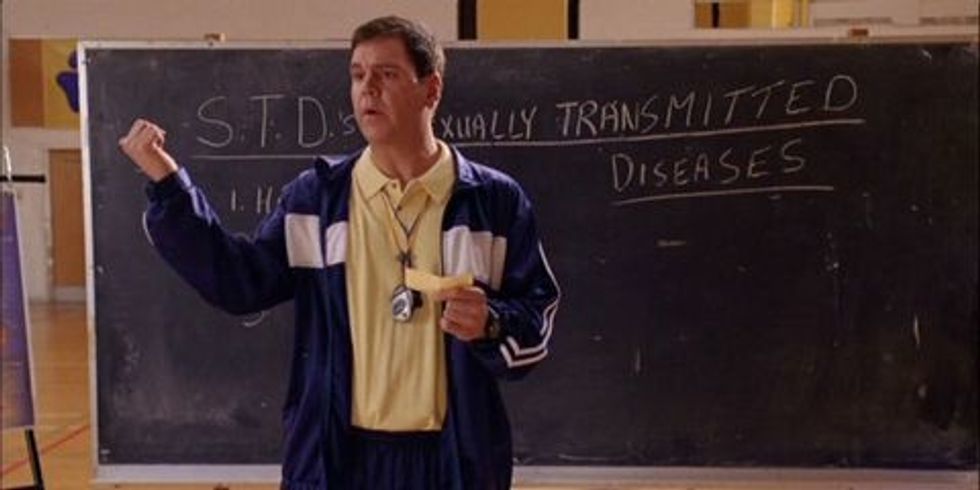One day in eighth-grade health class, my peers and I were each handed a brand-new brown paperback book called "Quest." We'd heard rumors about this infamous book throughout the last year-and-a-half of middle school, and now it was really in front of us.
It was a workbook, centered around abstinence. This was to be our "sex education."
It included stories, fill-in-the-blanks for the student and their parents to fill out together, and on the last page a contract that we were to sign pledging to not have sex until marriage.
Our next bout of "sex education" was in tenth grade, when we filled out diagrams of genitalia and were shown graphic pictures of STIs. It was a scare tactic. Condoms, or any other form of birth control for that matter, were not mentioned.
I thought this was a normal form of sex education in public secondary schools...until I went to college. Instead of laughing with me about this shared experience my peers would say, "Wait, that's a thing? That was really your sex ed?"
Sex is not nearly as taboo as it used to be. With the evolution of the internet and home computers, kids are bound to learn about sex sooner rather than later — whether it's online or from their friends.
Sex is a natural, enjoyable thing. You can talk to young people about the risk of pregnancy and STIs all you want, but that won't stop all of them from doing it from that information alone. I'd like to ask my alma mater's administrators: Would you rather keep kids in the dark about protection and continue to see teen pregnancy every year, or teach them how to do it safely — just in case? I think the answer is easy.
I went to a public high school. No religious affiliation whatsoever. If you believe in abstinence, whether it's tied to your religion or not, great. But not everyone does. In a public-school setting, there's no reason why proper sex education, including LGBT+ sex education, shouldn't be available to everyone. If parents don't want their kids learning about sex in school, they can intervene or send their kids to a religion-affiliated school.
Abortion is a hot button topic right now and connected to that is proper sex education. Yes, rape exists, and freak accidents happen. However, a lot of unplanned pregnancies, especially those by young people, could be prevented by knowing how to protect themselves in the first place.
I'm not saying teach them positions, show them porn, or hand out vibrators. I'm saying teach them about protection, and that sex is a natural thing.
Teach them that it's something they shouldn't be ashamed of wanting, but that they can wait however long they feel comfortable. Teach them to love their bodies. Teach them what consent means, the warning signs of an unhealthy sexual relationship.
Abstinence-only education should have been left in 1950, but unfortunately, it still exists around the country — including in my hometown. To those schools, I say shame on you, because every year you're only setting your students up for confusion and putting them in danger.







 Lumiere figure at the Disney Store at the Ala Moana Shoppi… | Flickr
Lumiere figure at the Disney Store at the Ala Moana Shoppi… | Flickr








 StableDiffusion
StableDiffusion StableDiffusion
StableDiffusion 10. Extra BlanketsJuwenin Home 100% Cotton Knitted Throw Blanket
10. Extra BlanketsJuwenin Home 100% Cotton Knitted Throw Blanket StableDiffusion
StableDiffusion StableDiffusion
StableDiffusion File:Kishlaru familie.jpg - Wikimedia Commons
File:Kishlaru familie.jpg - Wikimedia Commons Photo by Hanna Balan on Unsplash
Photo by Hanna Balan on Unsplash StableDiffusion
StableDiffusion black blue and yellow round illustrationPhoto by
black blue and yellow round illustrationPhoto by 





 woman holding glass jar
Photo by
woman holding glass jar
Photo by 








